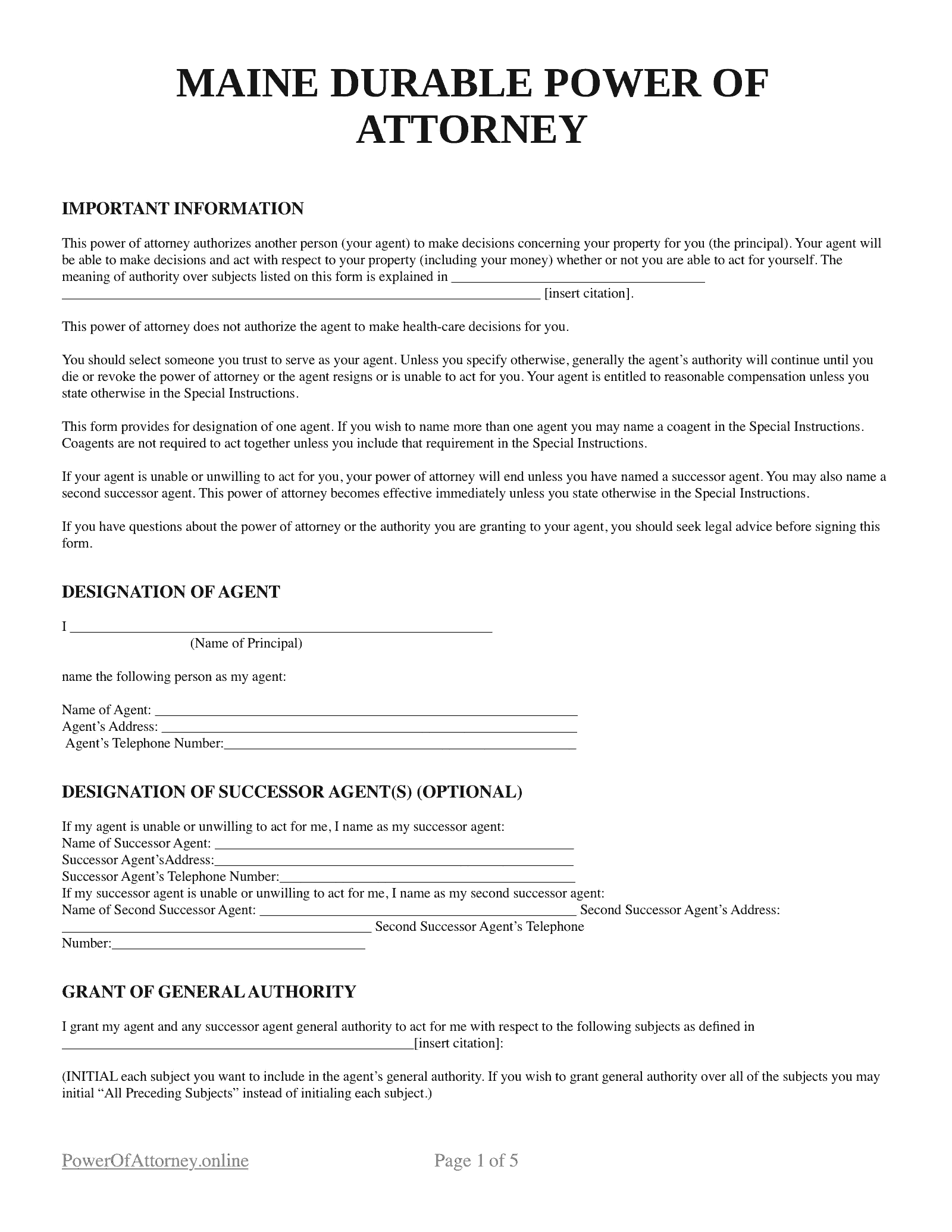Free Maine Durable Power of Attorney Forms
A Durable Power of Attorney for Maine is a critical legal tool that allows an individual, called the principal, to appoint someone they trust, known as an agent or attorney-in-fact, to handle their affairs.
Unlike traditional powers of attorney, which end when the principal becomes incapacitated, a Maine Durable Power of Attorney remains valid even if the principal is no longer able to make decisions.
This type of legal document provides the agent with authority to perform various tasks on behalf of the principal, including:
- Managing financial transactions
- Paying bills and settling expenses
- Signing important documents
- Withdrawing money from accounts
- Handling other legal or financial matters
A Durable Power of Attorney for Maine ensures continuity in managing personal and financial affairs, offering peace of mind for those who want their interests protected in case of incapacity.
Here’s everything you need to know about Durable Power of Attorney forms in Maine.

Maine Durable Power of Attorney Laws
Maine Uniform Power of Attorney Act - This statute provides guidelines on how powers of attorney are written and implemented in Maine. According to the law, a POA is durable because it is “not terminated by the principal’s incapacity” (18-C ME Rev Stat § 5-902.2).
Signing Requirements in Maine
The principal must sign the document, which acts as the agent’s authority to make decisions on behalf of the principal. If the principal is unable to sign the document physically, another person who is not the agent can sign on their behalf as long as they have permission from the principal.
The form becomes legal when it is acknowledged by a notary public. “A power of attorney is not valid unless it is acknowledged before a notary public or other individual authorized by law to take acknowledgments” (18-C ME Rev Stat § 5-904).
How To Write a Durable Power of Attorney Form for Maine
The Maine Durable POA serves as the agent’s written permission to make decisions for the principal. This excludes healthcare-related matters. Here are the steps to creating one:
1. Select an Agent
Find a person you trust with your business, finances, and other important matters. In many cases, the principal chooses their kin. This may be a spouse, romantic partner, or a child who isn’t a minor. You can appoint one of them as the principal or main agent, while others can be co-agents. The principal agent will make the final decisions, while the coagents can step up when the agent is not available.
Some principals may prefer someone they share professional ties with to be their agent. For example, a business partner or company lawyer.
2. Discuss the Powers With Your Agent
After selecting your agent for a Maine Durable Power of Attorney, it’s essential to clearly outline the authority you wish to grant.
This step ensures that the agent’s decisions align with your preferences and limits their actions to what you specifically authorize. Key points to address include:
-
Define the scope of authority:
- Clearly specify the decisions and responsibilities you want the agent to handle.
- Be as detailed as possible to avoid misunderstandings about your wishes.
-
Discuss compensation:
- While not required, it is customary to offer compensation for the agent’s services.
- Agents may also be reimbursed for any expenses they incur while fulfilling their duties.
Having an open and thorough discussion with your agent ensures clarity and helps establish a mutual understanding of their role and responsibilities.
3. Download a Maine Durable Power of Attorney Template
There are printable templates of durable POAs for the state of Maine online. Download one and make sure it follows the acceptable format. Fill it out with instructions your agent can use when handling business, financial, and legal matters for you. Review your document and be thorough to ensure that your instructions leave no room for confusion or ambiguity.
4. Sign the Document and Have It Notarized
The state of Maine Durable Power of Attorney form must be acknowledged by a notary public to be considered legal and binding. If, for some reason, you cannot sign the document yourself, ask somebody else to sign for you. There must be clear instructions that the representative is authorized to sign on your behalf.
Validity of a Maine Durable Power of Attorney Form
A Maine Durable Power of Attorney form grants the agent authority to act on behalf of the principal, and this authority remains effective even if the principal is declared legally incompetent. To ensure proper use and recognition of their role, the agent must adhere to specific guidelines:
- The agent should always carry a copy of the Durable Power of Attorney form to demonstrate their legal authority as the principal’s representative.
- When signing documents on behalf of the principal, the agent must:
- Write the principal’s name first.
- Follow it with the word “by,” their own name, and their signature.
- Clearly indicate their role by including the title “attorney-in-fact”.
By following these steps, the agent can properly execute their responsibilities and ensure their actions are legally recognized.